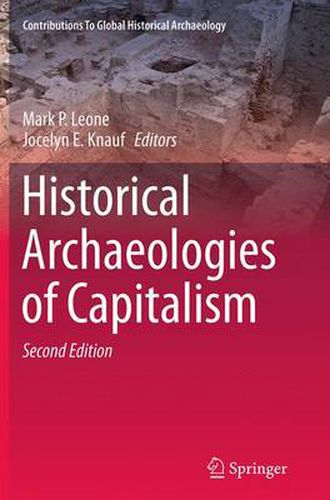Readings Newsletter
Become a Readings Member to make your shopping experience even easier.
Sign in or sign up for free!
You’re not far away from qualifying for FREE standard shipping within Australia
You’ve qualified for FREE standard shipping within Australia
The cart is loading…






This title is printed to order. This book may have been self-published. If so, we cannot guarantee the quality of the content. In the main most books will have gone through the editing process however some may not. We therefore suggest that you be aware of this before ordering this book. If in doubt check either the author or publisher’s details as we are unable to accept any returns unless they are faulty. Please contact us if you have any questions.
This new edition of Historical Archaeologies of Capitalism shows where the study of capitalism leads archaeologists, scholars and activists. Essays cover a range of geographic, colonial and racist contexts around the Atlantic basin: Latin America and the Caribbean, North America, the North Atlantic, Europe and Africa. Here historical archaeologists use current capitalist theory to show the results of creating social classes, employing racism and beginning and expanding the global processes of resource exploitation. Scholars in this volume also do not avoid the present condition of people, discussing the lasting effects of capitalism’s methods, resistance to them, their archaeology and their point to us now.
Chapters interpret capitalism in the past, the processes that make capitalist expansion possible, and the worldwide sale and reduction of people. Authors discuss how to record and interpret these. This book continues a global historical archaeology, one that is engaged with other disciplines, peoples and suppressed political and economic histories. Authors in this volume describe how new identities are created, reshaped and made to appear natural.
Chapters in this second edition also continue to address why historical archaeologists study capitalism and the relevance of this work, expanding on one of the important contributions of historical archaeologies of capitalism: critical archaeology.
$9.00 standard shipping within Australia
FREE standard shipping within Australia for orders over $100.00
Express & International shipping calculated at checkout
This title is printed to order. This book may have been self-published. If so, we cannot guarantee the quality of the content. In the main most books will have gone through the editing process however some may not. We therefore suggest that you be aware of this before ordering this book. If in doubt check either the author or publisher’s details as we are unable to accept any returns unless they are faulty. Please contact us if you have any questions.
This new edition of Historical Archaeologies of Capitalism shows where the study of capitalism leads archaeologists, scholars and activists. Essays cover a range of geographic, colonial and racist contexts around the Atlantic basin: Latin America and the Caribbean, North America, the North Atlantic, Europe and Africa. Here historical archaeologists use current capitalist theory to show the results of creating social classes, employing racism and beginning and expanding the global processes of resource exploitation. Scholars in this volume also do not avoid the present condition of people, discussing the lasting effects of capitalism’s methods, resistance to them, their archaeology and their point to us now.
Chapters interpret capitalism in the past, the processes that make capitalist expansion possible, and the worldwide sale and reduction of people. Authors discuss how to record and interpret these. This book continues a global historical archaeology, one that is engaged with other disciplines, peoples and suppressed political and economic histories. Authors in this volume describe how new identities are created, reshaped and made to appear natural.
Chapters in this second edition also continue to address why historical archaeologists study capitalism and the relevance of this work, expanding on one of the important contributions of historical archaeologies of capitalism: critical archaeology.